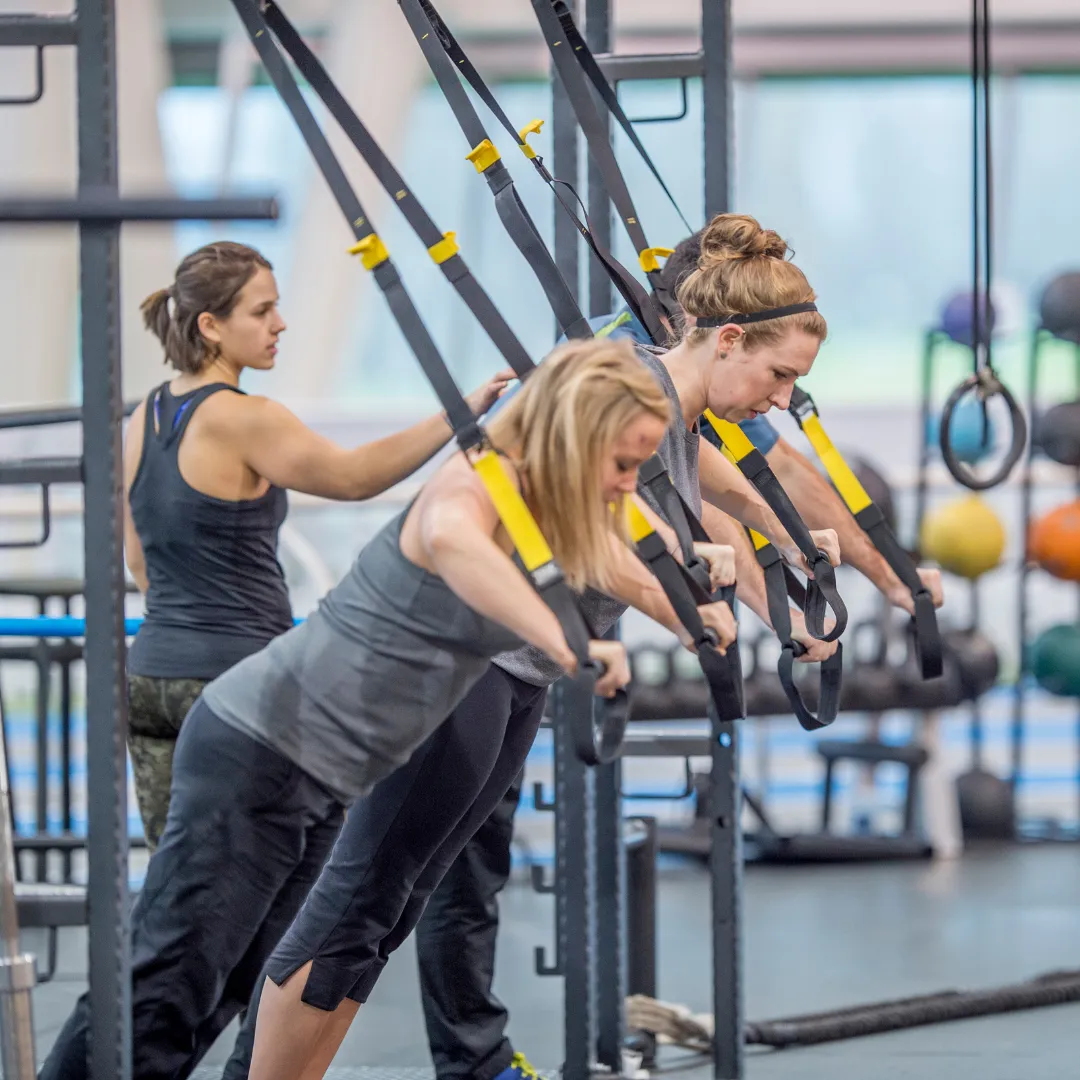WEIGHT LOSS & FITNESS BLOG

Exercise and Self-Compassion in Peri-Menopause and Menopause
I am a dude. I get it. I can't have any version of menopause. I can however, lend a listening ear. I can research evidence based methods for exercise and nutrition through different life cycles. I also work with 100s of women each month, generally in that period of their lives. I'm also learning alot from my wife as she shares her experiences with me. Everything in me wants to help. Although, I know sometimes, it's just more important for me to listen. I figured I can at least write a blog and attempt to share any practical information I've found that's evidence based. So, here we go...
Menopause can feel like your body’s suddenly rewriting the rulebook, and you’re just trying to keep up. One day you’re powering through your to-do list, and the next, you’re hit with a hot flash or feeling like your energy’s been drained. Melody, my wife, discusses these things with me daily. Add in changes like weight gain or mood swings, and it’s easy to feel frustrated or even defeated.
But here’s the good news: exercise and self-compassion can help you reclaim your strength and feel more at ease in your own skin. It’s not about being perfect—it’s about finding what works for you and embracing this new chapter with grace and grit. Oh and self compassion, is way more important than you might think.
Fitness: How much should you be getting and how intense?
Exercise (moving at moderate intensity 2-4 times per week for 30-60 minutes per session) seems to help with menopausal symptoms like cramps associated with changing menstrual cycles and inflammation, though it varies from woman to woman. Moderate intensity means you can talk during exercise but it isn't terribly easy to talk.
You also need to like it. But what if you don't? Try one or more of these 3 things:
Find Activities That Feel Good
Exercise doesn’t have to be something you dread. Experiment with different types of movement to discover what makes you feel energized and happy. The key is to prioritize fun and enjoyment over rigid rules. A combination of these things is probably best but remember to prioritize what matters most: strength training and regular cardio. Strength training needs to challenge you while cardio can vary.Ideas: Try dancing, hiking, water aerobics, cardio sessions at BFP, or Zumba classes for cardio. If you prefer calm and restorative activities, yoga or tai chi might be more your style. When exercise feels like self-care rather than a chore, you’re more likely to stick with it. For strength training see the next one.
Hire a Personal Trainer for Guidance and Motivation
A knowledgeable personal trainer can design a program tailored to your needs, helping you focus on the exercises that are most effective and enjoyable for you. They can also provide accountability and keep you motivated, making it easier to build consistency. Your trainer should always take into account what you enjoy, not just force feed you specific exercises.Benefits:
A trainer can adapt your workouts to your energy levels on any given day.
They ensure you’re using proper form, reducing the risk of injury.
Trainers make workouts fun and engaging by introducing variety and tracking your progress.
Tip: Look for a trainer experienced in working with women in midlife, who understands how to balance challenge with any physical limitations you might have.
Make It Social and Rewarding
Turning exercise into a shared experience can make it more enjoyable and help you stay consistent. Social connections and small rewards create positive associations with movement.Ideas:
Join a group training session like the ones at BFP to get a coach and a supportive group of friends.
Find a workout buddy who shares your goals or adopt a dog who will always motivate you for walks!
Celebrate milestones, like sticking to a plan for a month, by treating yourself to new workout clothes or a massage. At BFP, we celebrate several different milestones over time.
Exercise during varying stages of menopause and peri-menopause matters alot. Here's 5 reasons why:
Preserves Muscle Mass and Strength
During menopause, the decline in estrogen contributes to muscle loss (sarcopenia). Resistance and strength training can help counteract this by stimulating muscle growth and improving metabolic function.Evidence: A study published in Menopause showed that resistance training helps maintain lean body mass and prevents declines in muscle strength commonly associated with menopause.
(Source: Menopause: The Journal of The North American Menopause Society)
Improves Bone Health
Estrogen decline during menopause accelerates bone density loss, increasing the risk of osteoporosis. Weight-bearing and resistance exercises signal bones to remain strong and reduce the likelihood of fractures.Evidence: Research from the Journal of Bone and Mineral Research confirms that regular physical activity, particularly resistance training, improves bone density in postmenopausal women.
(Source: Journal of Bone and Mineral Research)
Reduces Risk of Cardiovascular Disease
Hormonal changes during menopause can lead to unfavorable cholesterol levels and increased cardiovascular risk. Aerobic exercise helps improve heart health, lower blood pressure, and manage cholesterol levels.Evidence: A systematic review in BMC Women’s Health found that regular aerobic activity significantly reduces markers of cardiovascular disease in menopausal women.
(Source: BMC Women's Health)
Supports Mental Health and Mood
Menopause can bring mood swings, anxiety, and depression. Exercise boosts endorphins (the body’s feel-good chemicals) and reduces cortisol, helping to improve mood and lower stress levels.Evidence: Studies in Maturitas report that physical activity, including yoga and aerobic exercise, reduces symptoms of anxiety and depression during menopause.
(Source: Maturitas)
Helps Manage Weight and Body Composition
Hormonal shifts during menopause can slow metabolism, leading to weight gain, particularly in the form of visceral fat (around internal organs), which poses significant health risks. Exercise helps manage weight and improve body composition by increasing calorie expenditure and promoting lean muscle mass.Evidence: Research in Obesity Reviews indicates that combining aerobic and resistance training is particularly effective for reducing visceral fat and improving body composition in menopausal women.
(Source: Obesity Reviews)
Be Patient With Your Progress
Hormonal changes can slow down the results you’re used to seeing. That’s normal. Your body is adjusting, and it needs time to respond to the positive changes you’re making. Instead of focusing on the scale or external metrics, shift your perspective:
Celebrate what your body can do. Feeling stronger, sleeping better, or simply moving pain-free are wins worth celebrating.
Progress isn’t linear, and that’s okay. Some days will feel easier than others—give yourself permission to rest when you need it.
Practicing Self-Compassion During Menopause
Menopause isn’t just a physical transition—it’s an emotional one too. As your body changes, it’s easy to slip into frustration or self-criticism, especially if your clothes don’t fit the way they used to or you feel less energetic than before. But here’s the truth: your body isn’t betraying you; it’s adapting to a new phase of life. Self-compassion can help you embrace this transition with kindness rather than judgment.
Why Self-Compassion Matters: As hormone levels shift, your body naturally holds onto more fat to support hormone production. While it’s tempting to fight against these changes, understanding their purpose can help you make peace with them. Accepting your body as it is right now doesn’t mean giving up on health—it means finding a healthy balance between caring for yourself and letting go of unrealistic expectations.
Practicing Self-Compassion During Menopause
Menopause isn’t just a physical transition—it’s an emotional one too. As your body changes, it’s easy to slip into frustration or self-criticism, especially if your clothes don’t fit the way they used to or you feel less energetic than before. But here’s the truth: your body isn’t betraying you; it’s adapting to a new phase of life. Self-compassion can help you embrace this transition with kindness rather than judgment.
Why Self-Compassion Matters: As hormone levels shift, your body naturally holds onto more fat to support hormone production. While it’s tempting to fight against these changes, understanding their purpose can help you make peace with them. Accepting your body as it is right now doesn’t mean giving up on health—it means finding a healthy balance between caring for yourself and letting go of unrealistic expectations.
How to Practice Self-Compassion
Redefine Fitness and Health for Yourself
Forget about trying to look like celebrities who seem to defy aging with an army of trainers and stylists. Instead, decide what being “fit” means to you. Maybe it’s being strong enough to carry groceries, flexible enough to join a yoga class, or active enough to enjoy hiking with friends.Allow Yourself to Grieve Changes
It’s okay to mourn the body you once had. Whether it’s through a heartfelt cry, journaling, or sharing your feelings with a friend, give yourself space to process the emotions that come with change.Set Realistic Expectations
Instead of chasing perfection, focus on what’s achievable and fulfilling right now. Prioritize sustainable goals, like improving your stamina, getting stronger, or reducing stress.Celebrate Your Strengths
Your body has carried you through every stage of life so far—it’s resilient, capable, and still evolving. Celebrate the little victories, whether that’s completing a workout, sleeping better, or simply showing up for yourself.Let Go of Harsh Self-Criticism
When the negative voice in your head speaks up, counter it with kindness. Remind yourself that you’re navigating a natural, challenging phase, and you’re doing your best.
The Takeaway:
Menopause is a time to shift your focus from criticism to care. Self-compassion is the key to embracing this phase with confidence and grace. By treating yourself with kindness and patience, you can create a foundation of emotional and physical well-being that will carry you through this chapter—and beyond.
I hope this helps!


Are you Ready to become
sTRONG - FIT - cONFIDENT?
Click the Button To Start Your Journey Today!!


